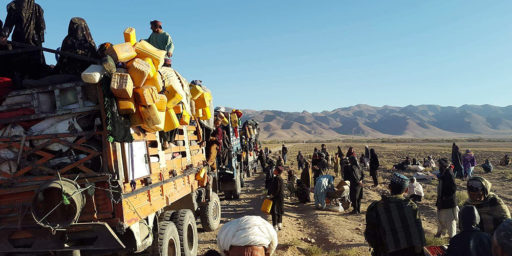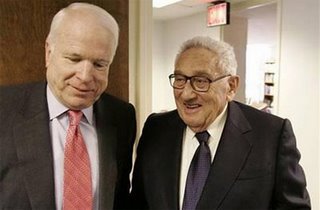So, What’s the Strategy in Afghanistan?
 If President Obama is to convey a clear message to our NATO allies about Afghanistan, he must choose between two competing alternative strategies, counterterrorism or counterinsurgency:
If President Obama is to convey a clear message to our NATO allies about Afghanistan, he must choose between two competing alternative strategies, counterterrorism or counterinsurgency:
With just a week until President Barack Obama flies to Strasbourg, France, for his first NATO conference, his top advisers are still divided over what U.S. policy should be on the summit’s No. 1 issue: how to fight the war in Afghanistan.
It’s a debate that the Bush administration never seriously had in the seven years following the post-9/11 invasion. Now, by contrast, in the wake of three major strategic reviews, Obama is extending and deepening the discussion of Afghanistan, because the outcome of this debate may set the course of American foreign policy for the remainder of his presidency.
says Fred Kaplan in Slate. After characterizing the costs and benefits of the two strategies he concludes:
Obama has to choose one approach or the other this week, if he hasn’t done so already. Afghanistan will fill the agenda at next week’s NATO conference. He has said that he’ll ask the allies to step up their involvement. But he can’t expect them to accede unless he requests specific measures and explains how they fit into a clear strategic context, and he can’t do that unless he decides what the strategy is.
I think there are several points that Mr. Kaplan doesn’t underscore sufficiently. First, the more successful either of those two strategies are, the more it will tend to destabilize Pakistan. Indeed, anything short of a complete elimination of the Taliban and Al Qaeda will tend to destabilize Pakistan and I can’t help but think that’s an objective that’s beyond our reach. Add to that the conundrum that we can’t eliminate the Taliban and Al Qaeda without extending our efforts into Pakistan where they’ve taken shelter, which will also tend to destabilize Pakistan.
Second, neither strategy promises an end to our involvement in Afghanistan for the foreseeable future nor does it place a ceiling on the costs. We know that counterinsurgency in Afghanistan will cost significantly more than it has in Iraq. What will the prospective cost of counterterrorism be?
Third, IMO the reflexive position for American policy with respect to Afghanistan would be to leave. As tempting as it might be, particularly from a domestic political standpoint (“Why are we spending billions in Afghanistan, etc.?”), that’s an alternative which is genuinely not open to us. The risks of a return to the status quo ante are just too high.
So, what’ll it be, Mr. President?
UPDATE (James Joyner): A good question. I put my thoughts on the matter at New Atlanticist earlier this morning: “Afghanistan: Counterinsurgency or Counterterrorism?“






I am working up a longer version of my response to this elsewhere… but the short version is that we’re probably wrong about the costs of the status quo ante.
Yes, AQ launched 9/11 while based in Afghanistan. But there was nothing inherent to Afghanistan that made the attack possible. Since 2001, U.S. forces have been attacked by over 81,000 IEDs. These IED networks have been built right under our noses, in countries we occupy.
If the “bad guys” can build a sophisticated enough network to deploy 81,000 IEDs, then what possible reason is there to believe that our presence in Afghanistan would prevent the implementation of a 9/11-level plot which was orders of magnitude simpler than the IED networks that still exist?
In short, if being in Iraq and Afghanistan cannot prevent massive IED networks from existing, then what makes anyone think that being there prevents a couple of dozen guys from prepping and perpetrating attacks like 9/11, Mumbai, London or Madrid?
The counter-terrorism argument for staying in Afghanistan is, in my opinion, by far the weakest of the arguments. Humanitarian obligations and the risk of destabilizing Pakistan (which I consider overstated as well) make a lot more sense — though I agree with your assessment about the difficulty to removing the risk to Pakistan at all.
I’m speaking mostly of the political risks, Bernard. I can’t imagine any president removing our forces from Afghanistan and then waiting to see if a terrorist attack materializes from that direction.
And just for the record I opposed the invasion of Afghanistan.
Indeed, I think it is the political costs which would be highest.
And for the record, I supported both the invasion of Afghanistan and Iraq. And I also think we should, as a nation, continue to keep open the option of engaging in regime change if our national interests require it. Which is why I am so concerned that we seem to want to turn every intervention into a long, drawn out affair. If eliminating an enemy regime implies a 15 year occupation where we try to transplant democracy, end corruption, and build a thriving free market economy, I think it tends to discourage otherwise reasonable uses of force.
There is something to be said for going in, smiting our enemies, and coming home quickly.
FTR, I supported the invasion of Afghanistan, but not Iraq. In the best of all possible worlds we employ a COIN strategy in Afghanistan, but that world is long gone. I think we try to manage Afghanistan on the cheap, while trying to improve relations with Russia and Iran, try being the operative word. We also work on Pakistan. If we cannot get Pakistan to resolve the tribal area, and they will not let us in, we may as well get out. Jihadists groups are transnational anyway, and can base themselves many, many places. If we leave, we should be preparing good human intel so that we can know what is going on.
Steve